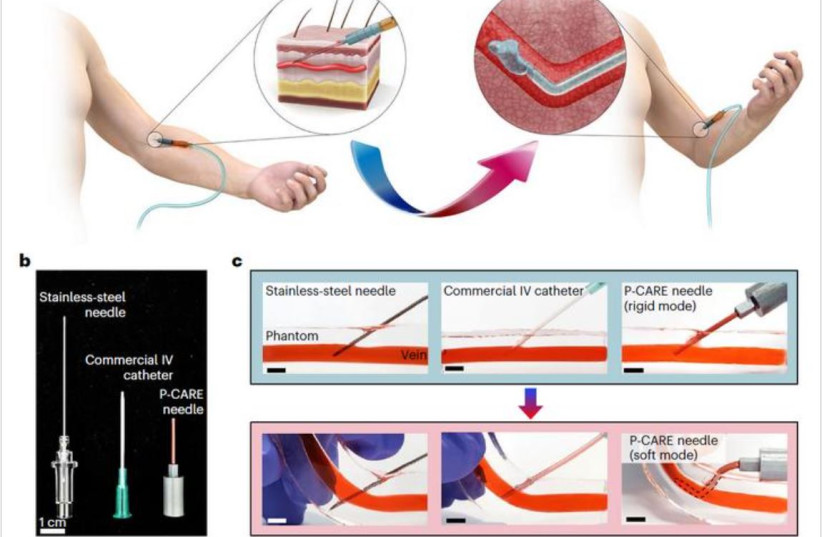Every minute, millions of people around the world are put on intravenous (IV) injections in hospitals and clinics. The technique induces speedy effects and allows treatment through continuous administration of medication by directly injecting drugs into the blood vessel. An estimated 16 billion medical injections are administered annually on a global scale, according to a World Health Organization (WHO) report in 2018.
Unfortunately, medical IV needles are manufactured from hard materials like stainless steel or plastic that don’t mechanically match the soft biological tissues of the body. This can cause critical problems in healthcare settings – from minor tissue damages in the injection sites to serious inflammations and unintended needlestick injuries that can infect doctors and nurses with dangerous diseases including HIV and hepatitis B or C.
The structure and ease of use of rigid medical IV devices also raise the possibility in poor countries of the unethical reuse of needles for reduction of injection costs, leading to transmission of deadly blood-borne diseases. In 2015, the World Health Organization (WHO) launched a policy on safe injection practices to encourage the development and use of “smart” syringes that have features to prevent re-use.
Now, researchers at the School of Electrical Engineersing at the Korea Advanced Institute of Science and Technology (KAIST) have announced their invention of Phase-Convertible, Adapting and non-REusable (P-CARE) needle with variable stiffness that can improve patient health and ensure the safety of medical staff.

The future of medical IV needles?
Prof. Jae Won-Il Jeong, doctoral researcher Karen-Christian Agno, Dr. Keungmo Yang, and colleagues said the new technology is expected to allow patients to move without worrying about pain at the injection site as it reduces the risk of damage to the wall of the blood vessel as patients receive IV medication. The needle becomes flexible upon insertion into the body due to increased temperature, adapting to the movement of a thin-walled vein.
The study has just been published in Nature Biomedical Engineering under the title “A temperature-responsive intravenous needle that irreversibly softens on insertion.”
“We’ve developed this special needle using advanced materials and micro/nanoengineering techniques, and it can solve many global problems related to conventional medical needles used in healthcare worldwide,” said Jeong.
The need is comprised of liquid-metal gallium that forms the hollow, mechanical needle frame encapsulated within an ultra-soft silicone material. In its solid state, gallium has a sufficient hardness that enables the puncturing of soft biological tissues, but the gallium melts when it’s exposed to body temperature upon insertion and changes it into a soft state like the surrounding tissue, enabling stable delivery of the drug without damaging blood vessels. Once used, a needle remains soft even at room temperature due to the supercooling phenomenon of gallium, thus preventing needlestick accidents and reuse problems.
Researchers also suggested that the needle could include a customized, ultra-thin temperature sensor with the softening IV needle to measure the on-site temperature to further enhance the patient’s well-being. The single assembly of the sensor-needle device can be used to monitor the core body temperature, or even detect if there is a fluid leakage on-site during indwelling use, eliminating the need for additional medical tools or procedures to provide the patients with better health care services.
